MarketMuse vs Frase vs Surfer SEO: AI Content Optimization Tools

Content optimization is like tightrope walking. You must tread the thin line of optimizing your content for search engines without disrupting the user experience.
My recommendation: Marketmuse vs Frase vs Surfer SEO
MarketMuse is an end-to-end content optimization platform with a higher price tag compared to other tools in the market. However, the price is well worth it if you’re a content agency or a business already making a good profit.
Frase is my tool of choice for small to medium-scale companies to drive their content creation effort. You can create high-quality content covering your focus topic in its entirety. Frase also has an in-built AI writer, which speeds up content creation.
Do you love diving into data and fine-tuning your content? Go with surfer SEO. Surfer also offers keyword research, which the other SEO content optimization tools in this list don’t provide.
If you prefer desktop tools over cloud-based ones, Website Auditor might work for you. Although it doesn’t offer all the advanced algorithms and data points the other tools in this list offer, it’s a decent budget tool.
Marketmuse vs. Frase
Compared to MarketMuse, Frase offers better workflow features for content creation and collaboration. Another key difference is the topic modeling; Frase only analyzes the top 20 results, but MarketMuse analyzes hundreds of thousands of pages.
Marketmuse vs. Surfer SEO
The main difference between MarketMuse and Surfer SEO is that MarketMuse offers personalized difficulty scores and recommendations, which Surfer doesn’t. In addition, MarketMuse topic modeling is better than Surfer’s because it uses a bigger data set.
If I had to pick one, I’d pick Frase for content creation because that’s where I create the best content. For the next round of optimization, I’d pick MarketMuse or Surfer SEO.
Depending on the company size and turnover, you’ll need different tools. Find my recommendations below:
Market Muse
Frase
Website Auditor
Surfer SEO
In an ideal world, you’d write for your customer avatar and wait for them to find your brilliant piece of content, but that rarely ever happens. High authority domains can rank even without content optimization, but smaller businesses do not have this luxury.
So how do you optimize your content to make it to the big leagues, aka the 1st page of Google?
The easiest way to optimize your content is to replicate what’s already working for the pages that rank.
Easy Peasy, right?
Ehh… not really.
You won’t have time to run a business if you’re manually analyzing every search result.
That’s where content optimization tools come in handy. Most content optimization software will analyze the top-ranking pages for your focus keyword and make the topic or keyword suggestions. You can read my post on SEO copy editing to see how these tools fit in my workflow.
What is Content Optimization Software?
The content optimization software is a tool that helps you to create content that matches user intent. Additionally, it helps your website and blog post rank in search engine results by suggesting relevant topics you need to cover in your content.
Best content optimization tool
With all the content optimization tools out there, people are spoiled for choice. On the surface, they all look the same, making one wonder why the price difference is so big. If you look closer you’ll see some offer more information, better competitor analysis, and work on completely different algorithms.
Relationship between search engines and content optimization
There is no big reveal about a naughty relationship, like in Telenovela. The relationship between search engines and content is much simpler than that. Content optimization helps you cover all the topics associated with a search query. This lets the search engines know that your content can provide the searcher with the information he is looking for.
Changing Google landscape and topic modeling
In 2018, Google confirmed they use topic modeling to drive a better search experience. This led to a rise in content optimization tools.
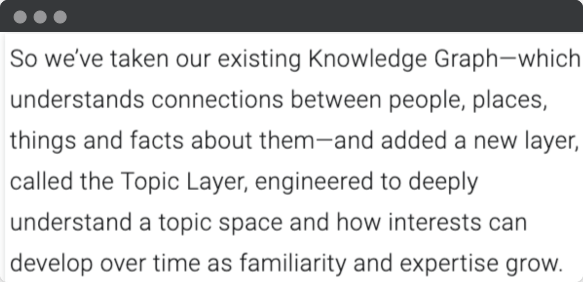
Okay, let’s jump right in.
Market Muse
MarketMuse is the best content optimization solution available in the market. MarketMuse algorithm relies on the Latent Dirichlet Allocation (LDA) model, which understands the connection between words in a collection of documents. This gives you a better semantic analysis compared to TF-IDF modeling. MarketMuse is the best content optimization solution in terms of topic modeling.
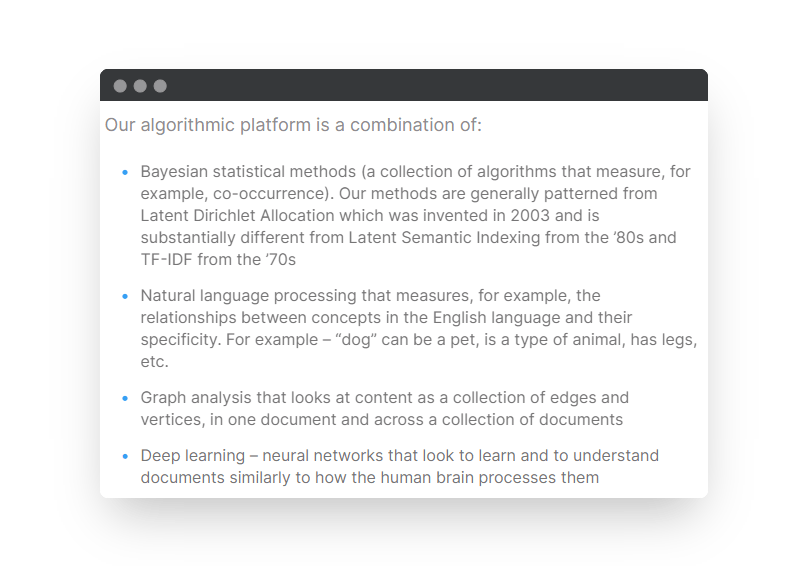
MarketMuse is a content optimization platform that stands apart from other tools because it offers personalized recommendations. It has a great workflow, perfect for a content team or content agency.
MarketMuse has 3 phases in the workflow: research, compete, and optimize applications.
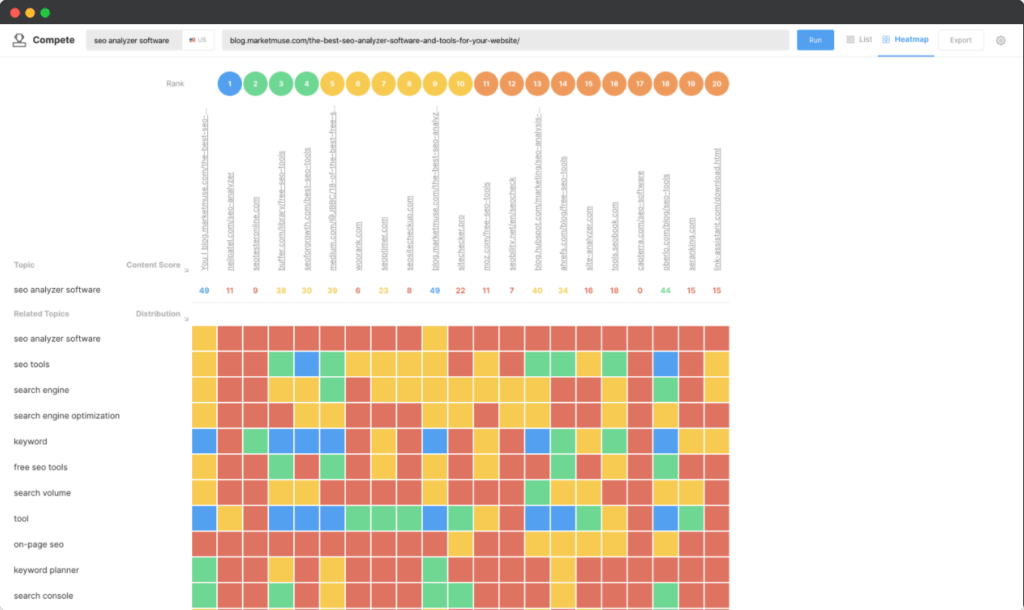
It gives you a sleek and easy-to-read dashboard that gives you quick insights about what’s working and what’s not in your content strategy. The dashboard makes content audit a breeze and helps you prioritize your efforts. MarketMuse has a lot more to offer. You can read my full MarketMuse review here.
Pricing plan update: Now they’re even offering a free version, which they never did before. All the other applications are available with the lower plans, but content inventory and dashboard are only available with the premium plan.
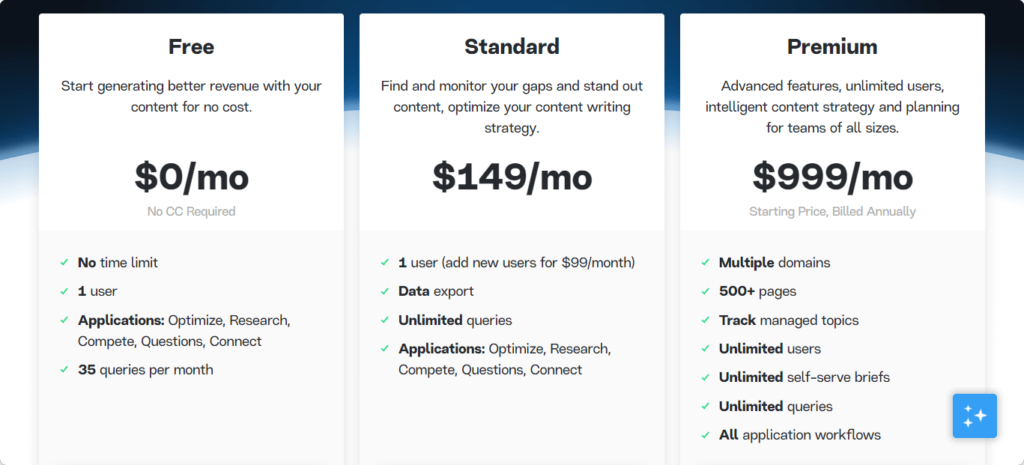
Frase
Frase is another artificial intelligence (AI) powered content optimization tool. It does more than content optimization, but we’ll focus on the optimization feature in this post. They have an AI-trained answer bot that converts your content into brief answers for your website visitors. You can also analyze the search terms and questions in the back-end to fine-tune your search engine optimization.
Frase is a new tool in the market, but it quickly became my favorite. Frase offers actionable insights at a glance, along with the options to drill down as needed.
It has a well-placed sidebar next to the editor that gives you a snapshot of all the details you need to optimize your focus topic. You can click over to the summaries, topics, questions, links, stats, and news tab to get further information. Another helpful feature is the user intent analysis. Frase analyzes the top organic traffic results and groups them into different buckets; this makes it easy to understand which format is already ranking on the search engine results page (SERP). The best part is you can get summarized text, making search engine optimization easy.
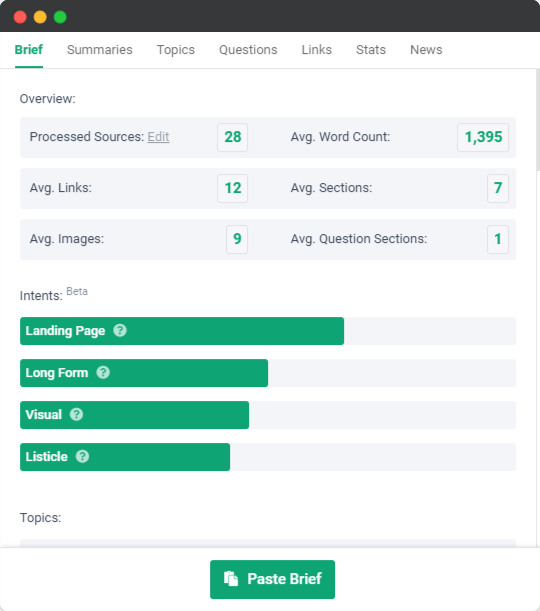
Frase gives you a co-occurrences report, which is the number of times a topically relevant keyword was used across several websites. The latest Frase update lets you use Natural Language Processing (NLG) to create FAQs and headers for your blog posts automatically. The basic plan starts at $44.99/month. I’ve seen significant improvement in search engine rankings using Frase. Writing in Frase makes my research and content creation process more efficient.
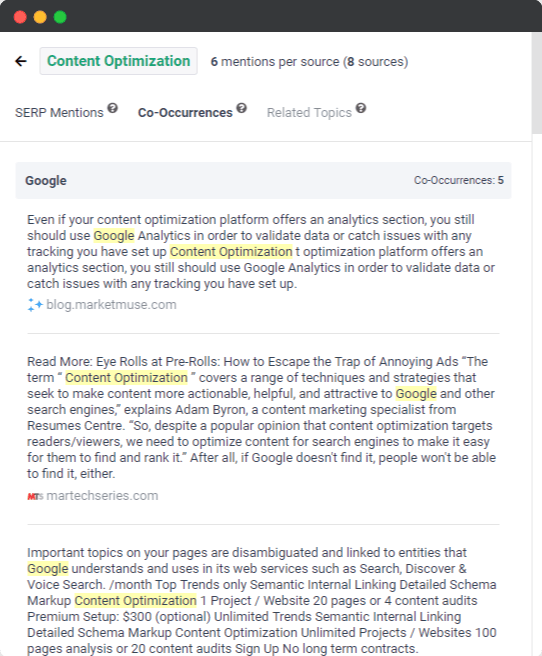
Frase recently came out with their version of a keyword research tool staying true to its conversational SEO model. You can add the seed keyword to get relevant questions around that topic. It gives you the search volume and lets you filter by various keyword modifiers. The modifiers are great to filter search terms with buyer intent. A lot of these question keywords might have low search volume but will be easy to rank.
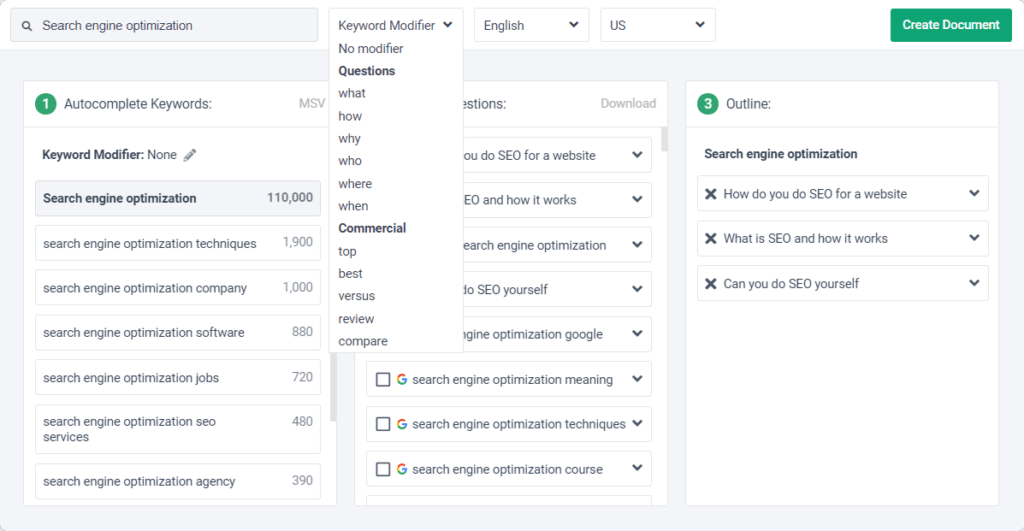
Frase AI content writer: The new AI content writer uses natural language processing to generate high-quality, human-like content. You can use this feature to write blog posts faster. By combining the Frase SEO and AI content writing features, you can easily create SEO-friendly content.
There are a lot more features, you can read my Frase review for a full overview.
Surfer SEO
Surfer SEO is a full-blown on-page optimization tool. The tool and interface could have a polarizing reaction depending on your preference to analyze reports. The data heads will love it, but you might feel overwhelmed if you prefer quick, actionable data. Surfer uses LSI and TF-IDF techniques to make suggestions, and they have natural language processing (NLP) on higher tiers. Surfer also came out with a content planner recently, making it easier to plan topic clusters and create your content strategy.
You can compare how factors like headline, title tags, content headers, word count, and so on vary across search results in a beautiful interactive graph. The SEO Audit tool in Surfer is a great way to get an overview of your page’s SEO metrics.
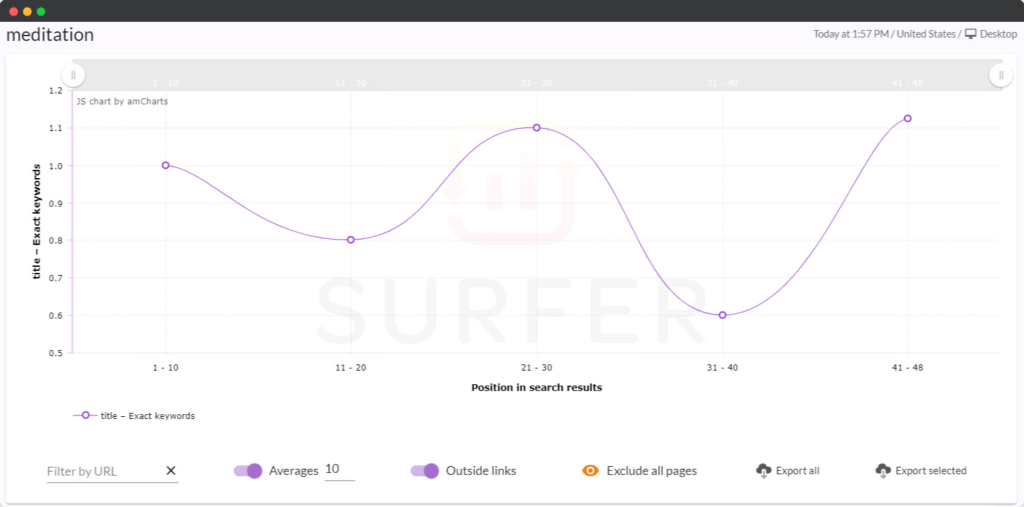
In contrast to the other tools on this list, Surfer SEO also has keyword research as part of its offering. This might make your content creation workflow easier.
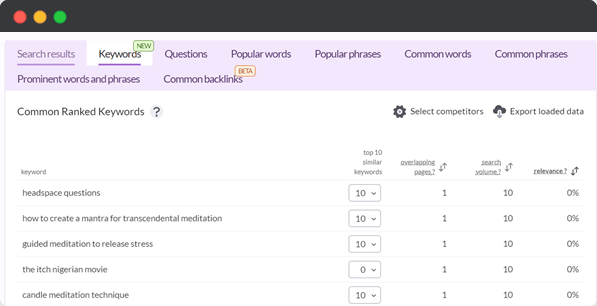
They have a nifty feature that shows the domain score and content score for all the sources you’re benchmarking against. This helps to understand if your competitor is ranking based on domain authority or the quality of content.
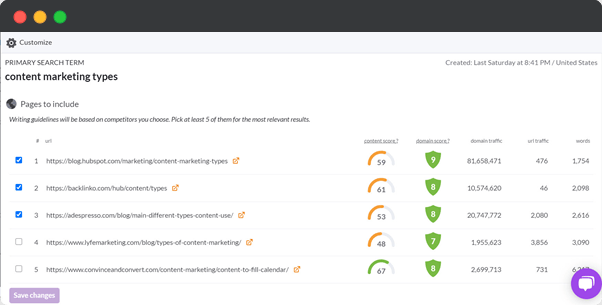
Surfer SEO has a free chrome extension that gives you the average word count, keyword search volume for your search phrase, and similar search terms. The chrome extension also shows you the traffic, number of words, and the number of times you used the exact keyword in the top-ranking pages. Surfer SEO released a content planner, but it’s still in beta, so results are kind of hit-or-miss.
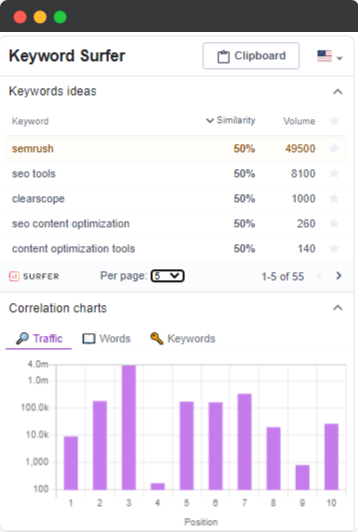
Frase vs Surfer SEO vs Marketmuse
Below is a comparison table of MarketMuse vs Frase vs Surfer.
Highlights from the table are given below.
- AI-powered NLP analysis is available only on the higher plans with surfer SEO
- MarketMuse doesn’t allow you to share the editor’s experience with external writers on most plans. You can share content briefs ($100) and first drafts ($200).
- SERP-based backlink suggestions and keyword research options are available only in Surfer.
- Automated content briefs and content templates are possible only in Frase and not in MarketMuse and Surfer.
- MarketMuse has content inventory, personalized difficulty scores, which are not available in Surfer or Frase.
- MarketMuse connect application suggests internal linking opportunities and content gap recommendations.
Features | Surfer SEO | Frase | MarketMuse | Additional comments |
Content Editor | Yes | Yes | Yes |
|
Automatic content import in the editor | No | Yes | Yes |
This is useful for optimizing existing content |
Support | Yes | Yes | Yes | They all have great support teams |
Realtime topic usage suggestions | Yes | Yes | Yes | The frequency of your usage drives the suggestion |
Content scoring | Yes | Yes | Yes | Each competitor is graded by their content quality |
SERP Analyzer | Yes | Yes | Yes | Surfer checks backlinks besides topic coverage. |
Question ideas | Yes | Yes | Yes | I believe Marketmuse is the most comprehensive |
External linking suggestions | Yes | Yes | Yes |
|
Topic gap analysis | Yes | Yes | Yes | Page level topic gap |
AI-powered NLP analysis | Only on higher plans | Yes | Yes | |
Geo-Targeting | Yes | Yes | Yes | Frase offers the most options |
Multiple Users | Yes | Yes | Yes | |
Shareable editor link | Yes | Yes | No | Content briefs (outlines) can be shared on MarketMuse |
Image suggestion, heading suggestion | Yes | Yes | No | Surfer and Frase suggest the number of images and headers based on SERP analysis |
Topic cluster | Yes | No | Yes | |
WordPress Integration | Yes | No | No | You need the Surfer SEO Chrome extension to get suggestions in Wordpress |
SERP based backlinks suggestions | Yes | No | No |
|
Content planning | Yes | No | No |
|
TF-IDF | Yes | No | No |
|
Automated content Briefs | No | Yes | 100$ credit required | Content outline generator |
Outline Builder | Yes | Yes | No | |
Google search console integration | No | Yes | No | You can see searches on your website |
Content templates | No | Yes | No | Frase has pre-built templates and gives you the option to create your own |
Vistor search tracking | No | Yes | No | Frase has an answer bot which tracks questions. |
Site level content gaps | No | No | Yes | Topic gap on your domain |
Content inventory | No | No | Yes |
|
Content audit | No | No | Yes | |
Personalized metrics and suggestions | No | No | Yes | MarketMuse makes recommendations based on your domain authority and topic authority |
Access to content strategists | No | No | Yes | |
Internal linking suggestions | No | No | Yes | MarketMuse It makes smart linking suggestions by avoiding your competitor's domain and including your network domain |
User Experience | 4.5 | 4.5 | 5 |
Website Auditor
Website Auditor lets you add your focus keyword and recommends related keywords based on your target keyword. You can use these recommendations when writing content to improve your chances of ranking in organic search.
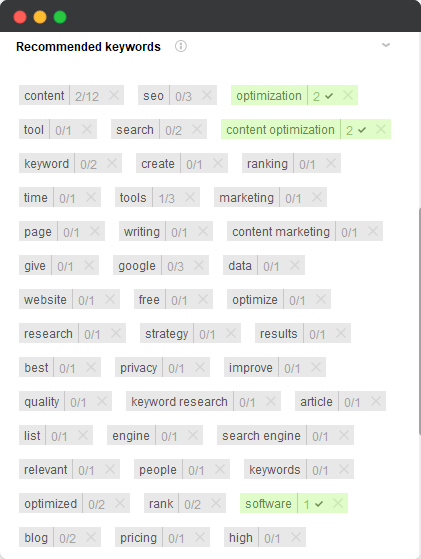
Miss your school days? Website Auditor gives you a content score based on your optimization rate. It flags any overused keywords and gives you an option to deep-dive into the density of single and multi-word keywords. The algorithm is based on the TF-IDF model. It provides broad recommendations, e.g., the website auditor suggests that I use the keyword optimization 1-15 times. The keyword turns green if I use it twice, which differs significantly from the recommended range’s lower end.
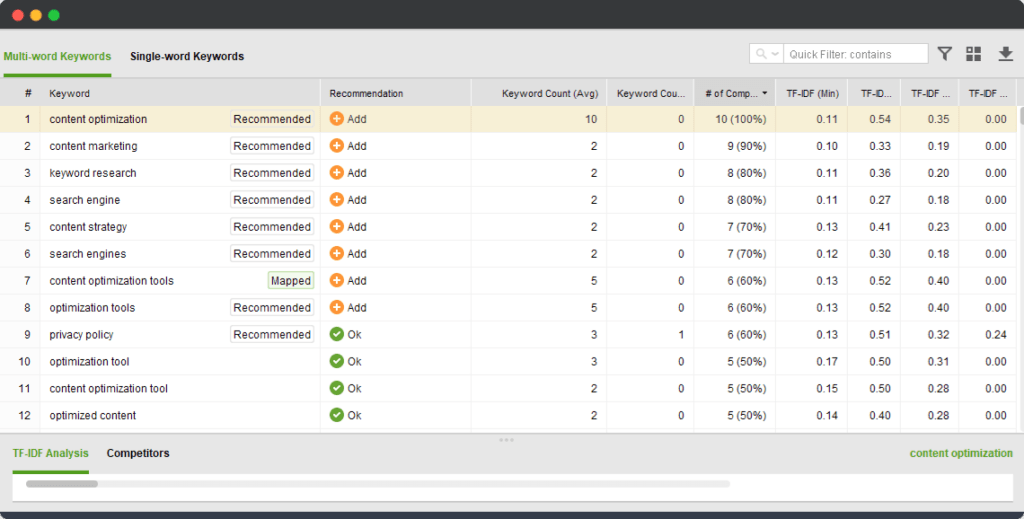
Free content optimization tools
Rankmath
Rankmath is not a SAAS content optimization software like the other ones on this list. It’s a WordPress plugin that took the market by storm. Yoast was the market leader — still is, in terms of market share — with no actual competition until RankMath came along and offered a ton of value and innovative features. In their free version, they offer most of the premium Yoast SEO features. Even SEO veterans like Matthew Woodward switched to RankMath because of the sheer value they provided.
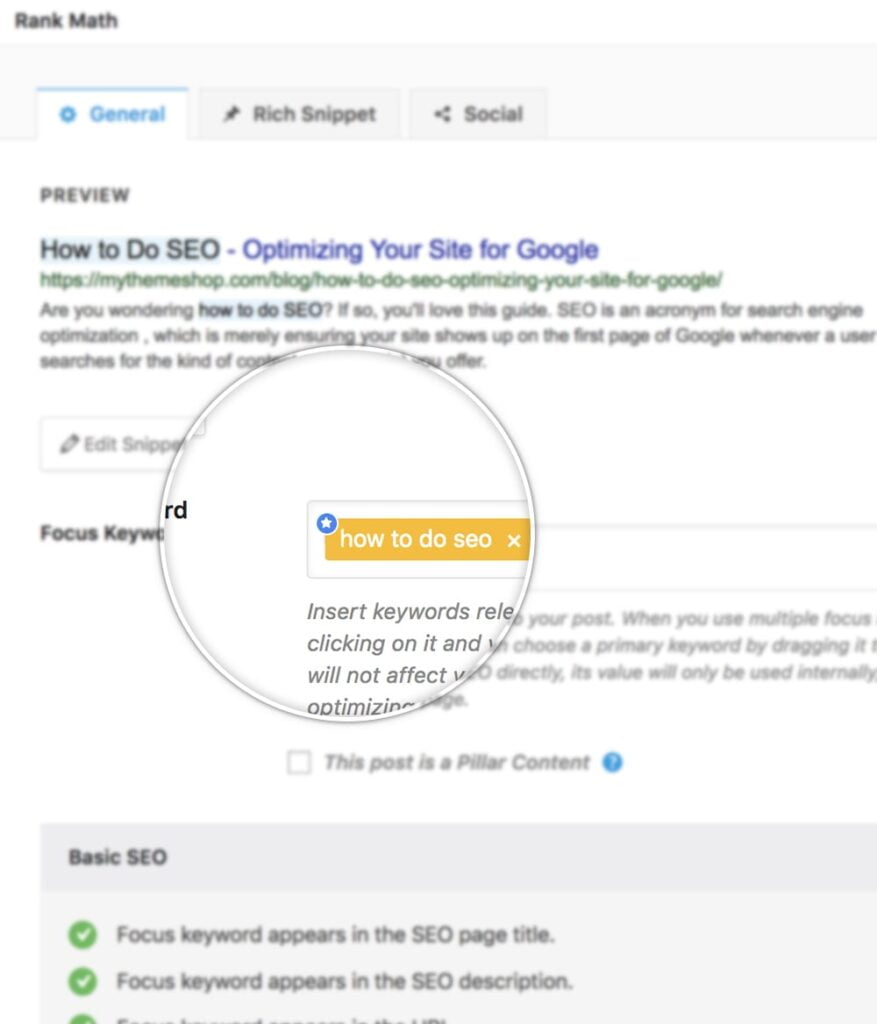
They help in optimizing your blog posts with features like:
- image SEO
- schema markup
- internal linking
- focus keyword
- content score and analysis
Basic SEO features like title, meta description, and so on are highlighted. Social previews and meta information help in social media optimization.
RankMath is more of an SEO optimization plugin than a dedicated content optimization software. It should be considered as an add-on to the other tools and not a replacement.
Conclusion
Hopefully, these content optimization software will incorporate content performance tracking into the workflow to make content tracking and measurement easier. These content optimizer tools will help you create better content, but link building remains a crucial ranking aspect and should be given weightage in your content marketing strategy.
Most importantly, don’t forget the human element when working with all these tools.
